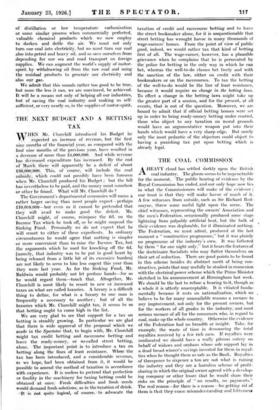THE NEXT ..BUDGET AND A BETTING TAX
Mr. Churchill introduced his Budget he 7 expected an increase of revenue, but the first nine months of the financial year, as compared with the first nine Months of the previous year, have resulted in a decrease of more than £4,000,000. And while revenue haSI'decreaSed expenditure has increased. By the end of there -Will apparently be 'a deficit of about £86;660;060: This, of 'course, Will include the coal sucliSidY; Which Could not poSsiblx., have been 'foreseen when 'Mr. Churchill produced his Budget ; but the bill haa'neVertheless to he paid, and the money must somehow or other 'be &mid: vcrillieNCill Mr. 'Churchill do ?
The Government's departmental economies will mean a rather larger saving than most people expect—perhaps 10,006;060—but eVen so it cannot be pretended that they will avail to -Make good the deficit. Mr. Churchill might, of course, reimpoSe the 6d. on the Incorne Tax which he took off, or he might suspend the Sinking Fund. Personally we do not expect that he Will resort to either of these expedients. In ordinary circumstances he would agree that nothing is simpler or more convenient than to raise the Income Tax, but the arguments which 'he used for knocking off the 6d. (naniely; that industry was to be put in good heart by being released from a little bit of its excessive burden) ate licit. likely to seem to him less cogent this year than they were last year. As for the Sinking Fund, Mr. Baldwin would probably not let profane hands—for so he would regard them--touch that. Altogether, Mr. Churchill -is most likely to resort to new -or increased taxes on-what are called luxuries. A luxury is a difficult thing to define, for what is a luxury to one man is frequently a necessary to another ; ' but of all the luxuries which Mr. Churchill might tax, it seems to us that betting ought to come high in the list.
We are very glad to see that support for a tax on betting -is steadily growing. In particular we are glad that there is wide approval of the--proposal -which we made in the Spectator that, to begin with, Mr. Churchill might tax credit betting and racecourse betting.- and leave -the- ready-money, or so-called street betting, alone. - The important - point is to introduce a tax on betting along the grieS of least resistance. Whew' the tax has been introduced, and- a considerable revenue, as we hope,' had been obtained froM it, it would be possible to amend the method • of taxation in • accordance with experience. It is -useless -to pretend that • perfection or finality in the machinery for taxing betting could be obtained -at once: -Fresh difficulties- -and fresh needs would demand fresh solutions; • as in the taxation of drink, wit -it hot quite logieali -of -eourse.:, to advocate the taxation of credit and racecourse betting and to leave the street bookmaker alone, for it is unquestionable that street betting has wrought havoc in many. thousands of wage-earners'. homes. From the point of view of public good, indeed, we would rather tax that kind of betting first of all. The wage-earner, however, has a plausible -grievance 'when he complains that he is persecuted by the police for betting in the only way in which he can bet, whereas the well-to-do classes bet freely and with the sanction of the law, either on credit with their bookmakers or on the racecourses. To tax the betting of the well-to-do would be the line of least resistance, because it would require no change in the betting laws. To effect a change in the betting laws might take up the greater part of a session, and for the present, at all events, that is out of the question. Moreover, we are bound to admit that if official betting houses were set up in order to bring ready-money betting under control, those who object .to any taxation on moral grounds would -have an argumentative weapon put into their hands which would have a very sharp edge. But surely only the most pedantic of the objectors could object to having a punishing tax put upon betting which is already legal.










































 Previous page
Previous page